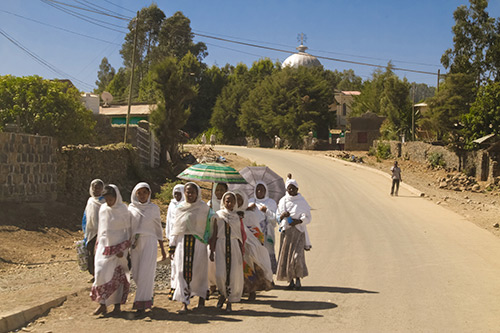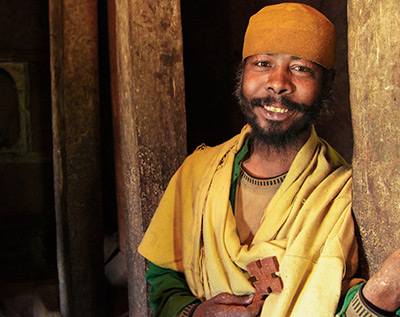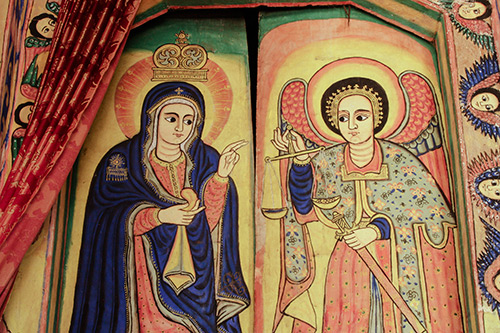 Girls of an Orthodox religious background in the Horn of Africa wear prayer shawls on their way to church. Large pockets of people in the region claim Orthodox Christianity as their religion but do not know the message of the gospel of Jesus Christ.
Girls of an Orthodox religious background in the Horn of Africa wear prayer shawls on their way to church. Large pockets of people in the region claim Orthodox Christianity as their religion but do not know the message of the gospel of Jesus Christ.
It’s bad enough for your husband to walk out on you.
It’s a completely different story for him to show up with a mob, armed with knives, ready to kill you.
 Orthodox priests in the Horn of Africa spend their lives at churches and monasteries steeped in highly symbolic Christian traditions and activities. But the truth of the gospel of Jesus Christ is often lost because of these traditions.
Orthodox priests in the Horn of Africa spend their lives at churches and monasteries steeped in highly symbolic Christian traditions and activities. But the truth of the gospel of Jesus Christ is often lost because of these traditions.“After I became a follower of Jesus, my husband would always insult me. I tried to share with him from the Word, but he said I wasn’t being a good wife and kicked me out,” Melesse* said. “Then one night when I was coming home late from work, he and five men followed me and broke down my door.”
They were coming to kill her for her faith in Jesus Christ, she said – even though their own churches are filled with crosses and paintings of Jesus.
Melesse’s people in the Horn of Africa are predominantly Orthodox Christian – but they miss the gospel, she said.
“These are the hidden lost,” said Aaron Shaw*, who along with his wife Lindsey* first shared the gospel with Melesse. “They appear to be Christian, and on maps that show a country’s religious makeup, this place is marked as a Christian region.”
They’re counted as “reached,” though they stone and beat people who carry the gospel, Shaw said.
“The enemy is always at work, but God is even more at work,” Melesse said. “This is trouble, but Christ promises that no matter what we go through, we will never be separated from Him.”
Melesse survived her husband’s attack. “I prayed to God, and in his power, they were knocked back,” she said. “I called the police, and they arrived quickly.”
But it wasn’t the only time she was attacked over her faith in Jesus. She’s been falsely imprisoned twice, she said.
And about a year and a half ago, Melesse and some other believers were visiting an older woman who had expressed interest in the gospel. It was a great visit, Melesse said.
When they got back to their car, a mob of Orthodox people were waiting for them, stones and sticks in their hands.
“They circled us and were preparing to beat us,” Melesse said. “We asked them what we had done to offend them, and they brought false accusations about us forcing people to convert. We told them, ‘No, we have come in the faith of our fathers to help the poor and share what it means to follow the Word of God.’?”
The faith of their fathers was pure at the beginning, Shaw said. Christianity first came to the region nearly 2,000 years ago, just after the death of Christ.
 Aaron Shaw* said when the legend portrayed in this church painting entered the Orthodox religion in the Horn of Africa, “the gospel died” there. In the story, the Virgin Mary rescues a cannibalistic murderer from hell by tipping the scales of judgment with her mercy.
Aaron Shaw* said when the legend portrayed in this church painting entered the Orthodox religion in the Horn of Africa, “the gospel died” there. In the story, the Virgin Mary rescues a cannibalistic murderer from hell by tipping the scales of judgment with her mercy.For centuries, Christ was at the center – until outsiders wove a macabre legend into their religion, Shaw said. In the folk story, a man was approached by Satan in disguise and asked to sacrifice his son.
“Delighted to have been found worthy like Abraham, he did what they asked, cooked and prepared his son for them to eat,” Shaw said. “Satan and the men with him asked him to take the first bite of his own son, and when he did, Satan revealed himself.”
The man snapped and went on a cannibalistic murder spree, Shaw said. The story recounts that after he eventually was sent to hell, Mary “tipped the scales in his favor with her mercy” and redeemed him to heaven.
“This is when the gospel died in this part of the world,” Shaw said.
This is the reason the Shaws, Melesse and other believers say they are gripped by the urgency of sharing the truth of redemption found only in Mary’s Son, Jesus Christ, to as many people as possible.
“We have the hope of new life and are filled with that new life,” Melesse said. “These people who are outside the area of those who have heard the gospel – God is putting on my heart to be able to communicate the gospel to them. Please pray for me to be prepared and to know the time and the place to go.”
Dawit*, another Christ follower in the area, said people’s spiritual need in the Horn of Africa is exponentially larger than any physical need they may have.
“This land has a deep spiritual famine,” he said. “People are hungering for the Word, but there are not enough people to take it to them.”
Dawit said his life is dedicated to Jesus’ last words – the Great Commission.
“We cannot afford to keep this Savior to ourselves,” he said. “Pray for me, that I would live my life as a bondservant. I desire nothing more than to offer my life as a living sacrifice to work in his harvest fields.”
To learn more about how to pray for the people of the Horn and how to reach out to those same people groups living in your area, visit prayforthehorn.com. – IMB
*Names changed.